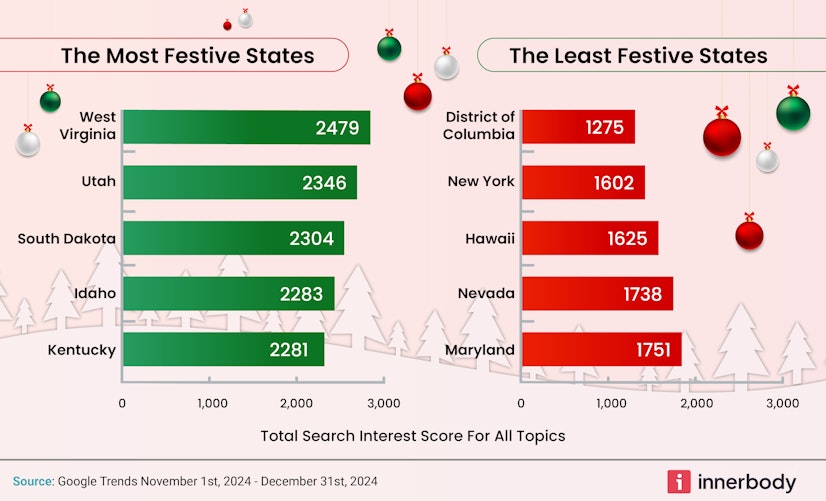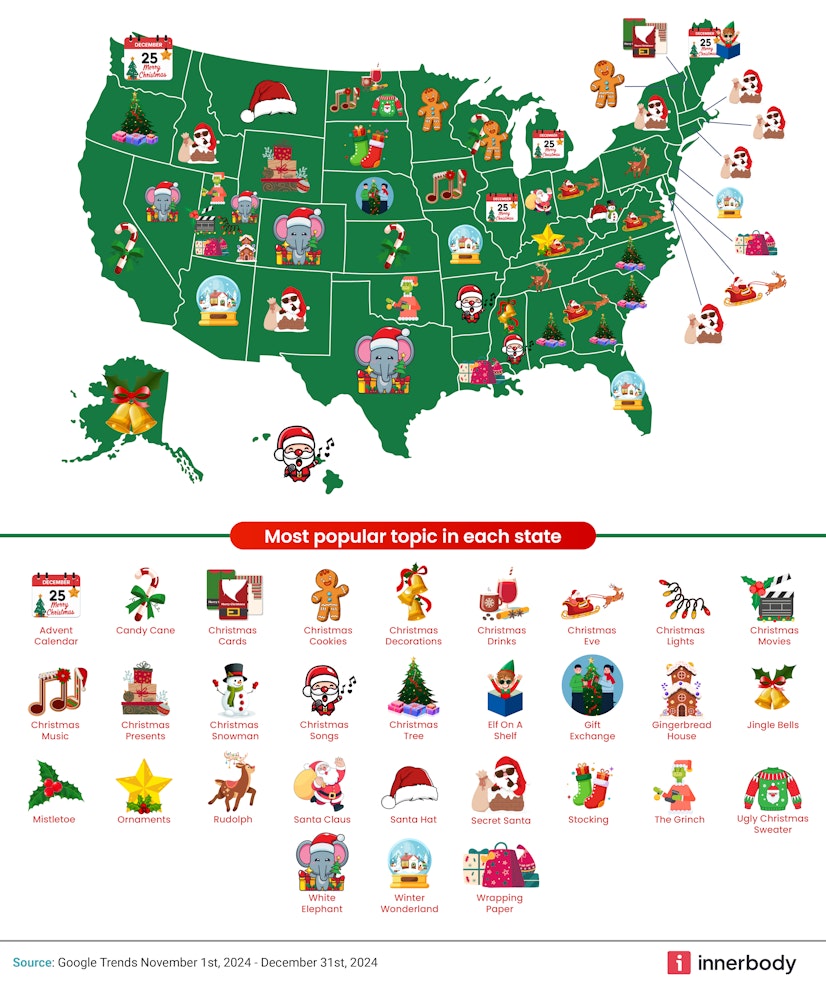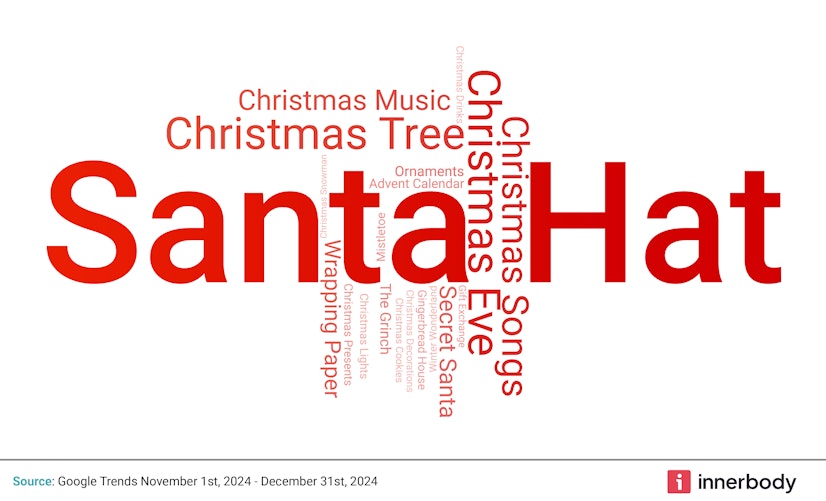Which U.S. state is the most festive at Christmastime?
West Virginia comes out on top for the fourth year in a row, but there are some new entries in our most — and least — festive state rankings!

Whether you celebrate for religious reasons or not, you’re more than likely part of the 91% of people in the U.S. who plan to either celebrate or observe winter holidays, such as Christmas, in 2025.1 This is only 1% lower than the percentage of U.S. adults who reported the same last year (92%), but 91% is still the overwhelming majority of Americans.
For the fourth consecutive year, our team analyzed search trends to determine which U.S. states are feeling the most holiday spirit and which are the Grinchiest. We also investigated how the popularity of various holiday trends and activities nationwide has fluctuated over the past year.
Read on to learn more about this year’s findings and see if your state made the nice list!
Jump to:
Key takeaways
- West Virginia won “Most Festive State” for the fourth year in a row.
- Kansas and Pennsylvania dropped out of our Top 10 from last year, while North Dakota and Nebraska stepped up their festive game and claimed their spots.
- Americans nationwide must have lost all of the “Santa Hats” they bought last year, since it’s the most popular part of the holiday season for the second year in a row.
- Materialism trending downward? Although most Americans (56%) say they expect to spend “about the same” as last year during the holidays, topics that you might assume would be popular — Christmas presents, decorations, lights, and gift exchanges — seem to be further from mind this year.2 In fact, those are some of the things Americans across the country seem to care about the least this time around.
- Though New York tried a little bit harder to get into the holiday spirit this year, it’s still one of the Grinchiest locations in the U.S.
- Whether it’s Washington state or Washington, DC, neither place is brimming with holiday cheer this year.
- The classic holiday tradition of hanging “Mistletoe” shot straight to the top of our least popular list this year. Perhaps Americans are starting to feel less enchanted by the traditional Hallmark Christmas movie romance.
Most and least festive states

Photo by Innerbody Research
For the fourth year in a row, West Virginia takes the award for “Most Festive State in the U.S.” This state was also the only one to show a high amount of interest in building a “Christmas Snowman,” a festive tradition that otherwise ended up on our least popular list. The state’s interest may stem from the fact that West Virginia is the only state entirely within the Appalachian region, which means it has an abundance of high elevations. In fact, the small town of Terra Alta in West Virginia literally means “high land,” and it gets an average of 175 inches — or a little over 14.5 feet — of snow per year.3 That’s a lot of snowman-building material.
Here, below our winner, you can see the other nine states that round out 2025’s nice list:
- West Virginia
- Utah
- South Dakota
- Idaho
- Kentucky
- Indiana
- North Dakota
- Nebraska
- New Hampshire
- Wisconsin
Interestingly, a couple of these states — Utah and Idaho — wound up in the exact same place on the list as last year. Just like West Virginia, they’re not giving up on their festive spirit so easily.
On the other hand, Kansas and Pennsylvania have fallen out of the top 10 this time around. But they didn’t just fall a few places; both of them snowballed down the rankings. Pennsylvania dropped from 6th to 14th (a difference of eight places), while Kansas fell from 3rd all the way down to 17th (a difference of 14).
Pivoting to the least festive states of 2025, the top 10 Grinchiest locations in the U.S. are:
- District of Columbia (Washington, DC)
- New York
- Hawaii
- Nevada
- Maryland
- Washington
- Florida
- California
- Massachusetts
- Virginia
It seems like the inland parts of the country are more festive than other regions of the U.S. at Christmastime, especially considering that only one of the least festive states (Nevada) lacks a coastline. Now, maybe the palm trees and beaches of Hawaii, California, and Florida don’t exactly invoke thoughts of Christmastime. But New York, particularly New York City, is known for countless beloved Christmas movies, and all the congresspeople in Washington, DC, leave town for the holiday — so you’d think these two would have a little more holiday cheer to go around.4
California and Washington state are new additions to this year’s least festive states list. And while we can understand that California may not be the first state that comes to mind as an ideal setting for Christmas, Washington offers a wealth of festive holiday experiences, from the Seattle Christmas Market and winter festivals to the Village of Lights, boat parades, themed train rides, and more.5
However, this lack of holiday cheer could be due to what the National Weather Service has dubbed “the big dark” — the wet weather of the fall and winter seasons in the area, combined with the earlier darkness of standard time. In fact, Seattle has one of “the most extreme dark seasons” in the country.6 Around 40% of Americans report a decline in mood during the winter, and the cold, dark weather plays a significant role in this.7 On top of that, the holidays can be hard on many people’s mental health. Whether or not your state made it on the most (or least) festive list, this is one of many reasons why it’s important to check in with your loved ones over the holidays.
Here are the full rankings of all states and the District of Columbia.
| Location | Total Search Interest Score | |
|---|---|---|
| 1 | West Virginia | 2479 |
| 2 | Utah | 2346 |
| 3 | South Dakota | 2304 |
| 4 | Idaho | 2283 |
| 5 | Kentucky | 2281 |
| 6 | Indiana | 2270 |
| 7 | North Dakota | 2263 |
| 8 | Nebraska | 2218 |
| 9 | New Hampshire | 2211 |
| 10 | Wisconsin | 2197 |
| 11 | Missouri | 2177 |
| 12 | Ohio | 2173 |
| 13 | Montana | 2168 |
| 14 | Pennsylvania | 2158 |
| 15 | Delaware | 2157 |
| 16 | Tennessee | 2157 |
| 17 | Kansas | 2150 |
| 18 | Wyoming | 2145 |
| 19 | Iowa | 2133 |
| 20 | Mississippi | 2119 |
| 21 | Maine | 2112 |
| 22 | South Carolina | 2112 |
| 23 | Oklahoma | 2091 |
| 24 | Alabama | 2067 |
| 25 | North Carolina | 2066 |
| 26 | Michigan | 2049 |
| 27 | Rhode Island | 2043 |
| 28 | Arkansas | 2040 |
| 29 | Texas | 2016 |
| 30 | Vermont | 2004 |
| 31 | Louisiana | 1990 |
| 32 | Alaska | 1963 |
| 33 | New Mexico | 1963 |
| 34 | Connecticut | 1962 |
| 35 | Illinois | 1955 |
| 36 | New Jersey | 1954 |
| 37 | Minnesota | 1930 |
| 38 | Arizona | 1886 |
| 39 | Colorado | 1846 |
| 40 | Georgia | 1811 |
| 41 | Oregon | 1794 |
| 42 | California | 1789 |
| 43 | Massachusetts | 1789 |
| 44 | Virginia | 1789 |
| 45 | Florida | 1783 |
| 46 | Washington | 1773 |
| 47 | Maryland | 1751 |
| 48 | Nevada | 1738 |
| 49 | Hawaii | 1625 |
| 50 | New York | 1602 |
| 51 | District of Columbia | 1275 |
Festive topic map

Photo by Innerbody Research
During our analysis, we identified a few notable trends when it comes to Christmas-related searches online.
Advent calendars
Four states across the U.S. — Illinois, Maine, Michigan, and Washington — were particularly eager to find the perfect Advent calendars this year. Their adoration was so strong that it propelled the tradition into the top 10 most popular searches list!
Advent calendars have German roots; they were a fun way for 19th-century Protestants to mark down the days until Christmas. These calendars eventually made their way to the U.S., and in the 1950s, they took on a new look with the addition of chocolates.8 These days, Advent calendars don’t necessarily have just small chocolates to open each day leading up to Christmas. Retailers have become increasingly creative; you can find everything from socks to beauty products, Legos, and more in these festive calendars.
Christmassy characters
When it comes to popular Christmastime characters, the devotion of a few states stands above the rest. While Oklahoma and Utah aren’t the Grinchiest states, they sure love the Grinch! Out of all the states, they searched for this beloved Dr. Seuss character more than any other. Similar to last year, Pennsylvania can’t get enough of Rudolph. But, this time, Tennessee is joining in on the reindeer games! Whether it’s the character himself or the 1964 stop-motion Christmas special, these states would give anything to be guided by the red-nosed reindeer.
Festive attire
After being a staple in our top holiday traditions list for multiple years, ugly Christmas sweaters have finally fallen out of favor. As of this year, only the citizens of North Dakota are still searching for the perfect ones to wear to their office Christmas parties.
It seems that Santa Hats have taken the popularity reins from ugly Christmas sweaters, as they remain the top holiday search for the second year in a row. Interestingly, however, only two states in the country are obsessed with these hats: Montana and West Virginia. Montana isn’t one of the most festive states, but it’s not on the least festive list either; it ranked 13th overall. But the sheer holiday-loving power of West Virginia was apparently enough to combine with Montana’s moderate love of the season to propel Santa Hats to a second year of victory.
Decorating
Speaking of love for a particular holiday item, it seems that Kentucky’s dedication to ornaments — something no other state displayed — was enough for it to land in 8th place on the most popular list this year. The state was also one of several to search for “Christmas Eve.” This combination of favorites could be tied to the tradition of decorating a Christmas tree on Christmas Eve or, in some cultures, “Little Christmas Eve” (December 23rd).9
Most and least popular aspects of Christmas

Photo by Innerbody Research
While “ugly Christmas sweater” was our study’s most popular holiday topic back in 2023, “Santa hat” came out on top last year and now, again, in 2025. As of this year, a Santa hat is the only holiday clothing item remaining on the top 10 list.
Here are the top 10 most popular Christmas searches on our list:
- Santa Hat
- Christmas Eve
- Christmas Songs
- Christmas Tree
- Christmas Music
- Wrapping Paper
- Secret Santa
- Ornaments
- The Grinch
- Advent Calendar
Overall, these are staples of the Christmas season — and they have been for decades. It’s wholly unsurprising to see topics like “Christmas Tree” and “Christmas Eve” make this list. In fact, most of them may make the list again next year.
However, compared to last year, there were some interesting shakeups. For example, Christmas songs were fairly low in popularity last year, but they rose to the challenge and climbed all the way to third place for 2025.
Gift exchanges are also always an interesting topic. Though gifts are a major tradition of the holiday season for many, the terms “gift exchange” and “Christmas presents” landed on the top 10 least popular list. Nonetheless, some states searched for these and related topics more than any other, including:
- Gift exchange: Nebraska
- White elephant: Colorado and Nevada
- Secret Santa: Connecticut, Idaho, Massachusetts, New Mexico, New York, Rhode Island, and Washington, DC
It’s interesting to see that several of the apparently least festive states — New York, Nevada, Massachusetts, and Washington, DC — all showed relatively great interest in various gift-giving traditions. Will giving or receiving that perfect present fill these states with a greater spirit of festivity next year? If hearts grow three sizes, we’re confident our annual report will show it.
Speaking of traditions, “Elf on the Shelf” finally saw an uptick in popularity after several years of decline. After climbing to 20th this year (up from 24th), perhaps this Christmas craze from the early 2000s is making a comeback. Based on the 2005 book “The Elf on the Shelf: A Christmas Tradition,” the story focuses on a toy “scout elf” that watches over the children in a household (both naughty and nice) and reports back to the North Pole at night. While fun for kids of all ages, there’s one drawback for parents — the elf must be moved to a new location every night in preparation for the next day. If you find yourself scrambling for a new hiding place idea at midnight, you aren’t alone; however, Pinterest is a treasure trove of ideas, as is the Elf on the Shelf website.
Coming in 10th this year is “Christmas drinks,” up from dead last in 2024. This could be, in part, due to Gen Z’s increasing avoidance of alcohol. About a quarter of Gen Z “never” drinks alcoholic beverages, and they’re 31% more likely to be interested in low or no alcohol. This is in stark contrast to previous generations, and it may shape how future generations view things like holiday-themed drinks.10
But, taking that dead last place this year is Mistletoe — a tradition that wasn’t on our most or least popular lists over the past few years. The disdain for this poisonous plant doesn’t appear to have any particular reason, so we can only assume that the general public may be growing weary of Christmas romance clichés, like “accidentally” meeting under the mistletoe.11 (Except for Mississippi; based on our findings, they’re still big fans.)
That being said, here are the top 10 least popular aspects of Christmas 2025 based on popularity trends:
- Mistletoe
- Christmas Presents
- Gift Exchange
- Gingerbread House
- Christmas Lights
- Winter Wonderland
- Christmas Cookies
- Christmas Decorations
- Christmas Snowman
- Christmas Drinks
Methodology
We used Google Trends search data to assess which U.S. states were the most and least festive about celebrating Christmas, as well as the most popular aspects of the Christmas season across the country. To accomplish this, we used a list of dozens of search topics pertaining to Christmas festivities during the months of November and December. We determined which topics were most frequently searched in each state and used the data to analyze the relationships between these search topics and the states. Combining the interest scores from all of these popular Christmastime topics, we identified which states were the most and least festive.
Fair use statement
Innerbody Research is committed to providing objective information and research to help our readers make more informed decisions regarding health and wellness. We invested the time and effort into creating the first of these Christmastime reports years ago to see which states ranked the highest and lowest for fun, festive trends that occur during the Christmas season. And the annual tradition has stuck! We hope to reach as many people as possible by making this information widely available. As such, please feel free to share our content for educational, editorial, or discussion purposes. We only ask that you link back to this page and credit the author as Innerbody.com.
Sources
Innerbody uses only high-quality sources, including peer-reviewed studies, to support the facts within our articles. Read our editorial process to learn more about how we fact-check and keep our content accurate, reliable, and trustworthy.
National Retail Federation. (2025). Consumers to Spend Second-Highest Amount on Record, According to NRF Holiday Survey. NRF.
Saad, L. (2025). U.S. Holiday Shoppers Plan to Spend Briskly. Gallup.
Whetstone, R. (2023). You’ll Want To Visit The Snowiest Town In West Virginia This Season. Only in Your State.
Alejandro. (n.d.). 15 Christmas Movies Filmed in New York City (Holiday Guide). New York Simply.
Thalheimer, E. (2025). Winter Wonderland: Discover Washington’s Festive Holiday Events. State of WA Tourism.
Sanford, N. (2024). The ‘Big Dark’: How Washingtonians weather the gloom & gray. PBS.
American Psychiatric Association. (2022). New APA Healthy Minds Monthly Poll Finds that Nearly 40% of Americans Face Declining Mood in Winter. APA.
Treisman, R. (2023). Advent calendars, explained: Where they came from and why they're everywhere now. NPR.
History.com Editors. (2025). History of Christmas Trees. History.com.
Smith, M. (n.d.). Bottoms up: A cocktail of alcohol consumption trends. GWI.
U.S. Food and Drug Administration. (2025). Take the "Oh No!" Out of Your and Your Pets' Holiday "Ho-Ho-Ho!" FDA.





